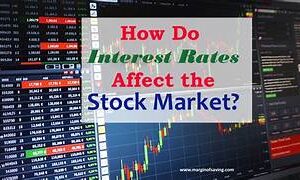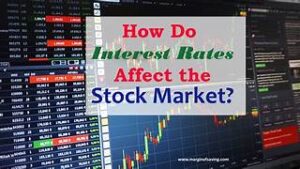The Reserve Bank of India (RBI) raised the repo rate (Interest Rates) by 0.25% in Feb’23 (see repo rate history since 2005). This was the fifth repo rate hike since Oct 2020. The rising interest rates often have a negative impact on the stock market. They make it more expensive for businesses to borrow money and invest, creating a liquidity crunch in the economy.
The impact of the rate hikes will vary depending on the sector and the company. Companies that are highly leveraged and rely on debt financing will be the most affected. These companies may have to cut back on their investments and operations, which could lead to lower earnings and stock prices.
The rate hikes are also likely to dampen investor sentiment. Investors may become more cautious and less willing to take risks, which could lead to a sell-off in the stock market.
However, the impact of the rate hikes is not only negative. Some sectors, such as Banks and NBFCs, could benefit from the higher interest rates. They will earn more money from lending. They will see their profits improve as their borrowers will pay higher interest rates on their loans.
Let’s get deeper into the basics of how the rising interest rates impact the stock market.
#1. Why Interest Rate (Repo Rate of RBI) is Rising?
After COVID-19, inflation is on the rise all over the world. All major economies of the world are impacted by the rising inflation scenario. Developed country like the USA and countries in the European Union was dealing with inflation at 1% or below levels. But post-COVID, the decades of low inflationary economy seem to have ended. Even the USA and UK are now dealing with 8% level inflation rates.
| Economies | Year-2020 | Year-2023 | Rise By |
| USA | 1.23% | 8% | 6.77% |
| UK | 0.99% | 7.92% | 6.93% |
| Germany | 0.14% | 6.87% | 6.73% |
| France | 0.48% | 5.22% | 4.74% |
| Italy | -0.14% | 8.20% | 8.34% |
| S.Korea | 0.54% | 5.09% | 4.55% |
| Japan | -0.03% | 2.50% | 2.53% |
| Australia | 0.85% | 6.59% | 5.74% |
| India | 6.62% | 7.44% | 0.82% |
| Brazil | 3.21% | 9.28% | 6.07% |
| South Africa | 3.21% | 7.04% | 3.83% |
| Indonesia | 1.92% | 4.21% | 2.29% |
| Malaysia | -1.14% | 3.38% | 4.52% |
The USA and major economies of the European Union have seen a stubborn rise in inflation. Hence, in those countries, the focus came on the interest rates. Though India is not as affected by the growth in inflation rates, being a fast-developing country, it can quickly go off limits. Hence, the Indian government has kept the Repo Rates tight since October 2020.
The repo rates are taken as a reference to decide the interest on all types of bank loans. In a rising repo rate scenario, bank loans charge high-interest rates. Moreover, repo rates are also a basis for discount rates of future cash flows. It is used to calculate the present values of all future cash flows.
This is the reason why, when interest rates are rising in an economy, it impacts the related stock market.
There is a famous quote of Warren Buffett on this subject. “The most important item over time in valuation is obviously interest rates. If interest rates are nothing, values can be almost infinite. If interest rates are extremely high, that’s a huge gravitational pull on values.“
– Warren Buffett
Central Banks of all major economies of the world are raising interest rates to tame inflation. However too high rates can have a negative effect on the GDP growth.
So, as a stock market investor, we must know that there must be a balance between inflation, interest rates, and the GDP growth rate. In a falling interest rate scenario, a quick bull run is common. But in a balanced economy, a slow but steady bull run can be achieved.
This calls for another question:
#2. How The Rising Interest Rates Impacts The Stock Market?
When we say stock market, we are either talking about the major indices like Nifty 50 or Sensex, or the individual stocks. When interest rates are on the rise, it generally affects the stocks and indices negatively.
Generally speaking, there could be four ways in which a rising repo rate can affect the stock market as a whole.
Four Factors
- Companies Make Less Profits: Capital-intensive companies who rely more on debt to finance their working capital and growth, generally have a heavy loan book. When interest rates are on the rise, the interest expense of these companies increase. This in turn decreased the company’s absolute profit and profitability. The falling profits and margins work as a drag on their stock’s price. The majority of companies are affected by rising interest rates, hence the stock market as a whole gets negatively affected.
- Investors Give Less Valuation to Company’s Stocks: Value investors value stocks by calculating the present value of their future cash flows. This is done by discounting future cash flows using a discount rate. The discount rate (WACC) increases when the repo rates rise. This leads to a lower present value of stocks leading to it’s price fall.
- Alternative Investments Look Dearer: Rising inflation hence interest rates cause devaluation of currency. During a high inflationary environment, investors invest more in alternative investments like gold and real estate. Furthermore, when interest rates are rising, fixed instruments like bonds and deposits also fetch better returns. Hence, investors shift there as well.
- Negative Sentiment: Generally speaking, people do not like rising interest rates. Why? Because it makes debt costly, liquidity is restricted and hence people can spend less. Moreover, rising rates lead to things becoming costlier. It creates a negative sentiment among people. In such a situation people tend to invest less leading to negative movements in the stock market.
These four reasons caused by rising interest rates negatively affect the stock market.
It is clear that rising repo rates are neither liked by people nor the corporates. But are all companies equally impacted by the rising repo rates? Which companies are most and least affected:



